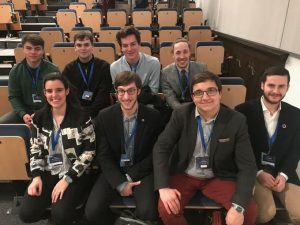
You might wonder why you should read about internationalisation in the time of COVID-19. This pandemic has, for the first time in our lifetime, shut down borders and quite literally grounded us. Does it really make sense to talk about international experiences without physical mobility? Topias Tolonen’s answer is ‘yes’. As this crisis has shown us, we need to rethink what internationalisation means and how we make it accessible to everyone, maybe even right here at home.
Topias Tolonen is not new to the conversation about the value and challenges that comes with internationalisation. He is currently in the International Affairs Group at the University of Helsinki, which is where everything that has to do with internationalisation is debated. In addition, he is actively involved with the Student Union of the University of Helsinki, where he also deals with issues of international affairs among other things. In January 2020, he was selected to represent the University of Helsinki in the Una Europa Student Board and he just finished his term this August. Una Europa is an alliance with eight member universities, the University of Helsinki is one of them. The alliance has embarked on a journey towards a more integrated European Education Area and a common European campus. This means imagining the future of higher education through joint degrees, virtual mobility, living labs and much more.
But for Topias Tolonen the interest and passion for internationalisation started long before applying for the student board of Una Europa.
“I have been active in the Student Union for years, most recently I’ve started working as a specialist on the topics of higher education policy and internationalisation. I have been thinking about what it means for a university to be international and what that might look like in practice. The reason why I applied to join the student board of Una Europa is that I saw this alliance as an opportunity to learn. I wanted to see their approach to this question and get an example of a concrete manifestation of what an international university could look like.”
Reflecting on his time as a student representative in Una Europa, he argues that it was not just about understanding how this alliance might help or support internationalisation. In Topias’ opinion, it was also a way to get engaged and potentially impact the European landscape of higher education. Una Europa is an entry point to participate in and shape that conversation.
This is a big endeavour, and many challenges lie ahead but also plenty of opportunities. Topias was working with seven other students, each representing one of the other participating universities. Their role was to bring the student voice to this alliance, to make sure that what is being done in the different working groups has relevance to students and is addressing students’ wants and needs. Initiatives include joint bachelors, masters and doctoral programs, virtual mobility, new pedagogical approaches, challenge-based learning and much more.
pedagogical approaches, challenge-based learning and much more.
The student board of Una Europa sends representatives to the steering and executive committee meetings. The goal is for the student voice to be present and to have a clear link between the high-level decision-making taking place in the steering groups and working groups and the students on each campus. Topias really sees it as quality assurance of the work that is happening to make sure that it is benefiting students and other stakeholders. The money for the project is coming from Erasmus, so students should definitely have a clear voice in Topias’ opinion.
“It is challenging when you are part of a newly started project. How to put the structures in place that keep students involved and informed continuously and make sure that we as the student board were kept informed about new information and knowledge being circulated.”
Topias Tolonen is very clear on the value of international experiences and would like more students to benefit from it. He sees Una Europa as a possibility to remove the obstacles and challenges that students might be facing when considering an international experience.
“Based on the Eurostudent VIII study, one of the key points that keeps Finnish students from applying to go abroad is financial matters. The cost can be high and they lose the income from their job while abroad. There are also many practical questions and just many unknown factors that make people think twice. Una Europa is piloting virtual mobility, which is very interesting, but I’m also curious to see the potential and implementation of blended mobility.”
Topias really wants to expand and rethink the idea of mobility. He wants it to be accessible to a broader range of students and work to break down as many barriers as possible. He argues that there are many initiatives that could make the process of going abroad easier, such as centralising information and making the application process clear and simple.
“I still believe that the threshold to applying to go abroad is too high. That is an issue. But again, if everything goes according to the plan, an alliance like Una Europa will support us in breaking down these barriers and making the technical and administrative side of things much simpler. I think that is very valuable and something that all students should really be excited about!”
Topias Tolonen has finished his term as a Student Board member, he is now focusing his energy working at the Student Union of University of Helsinki (HYY) as a specialist in higher education policy. This conversation took place in the fall of 2020.
Since September this year, Teemu Turkki is the new student board member for Una Europa.

